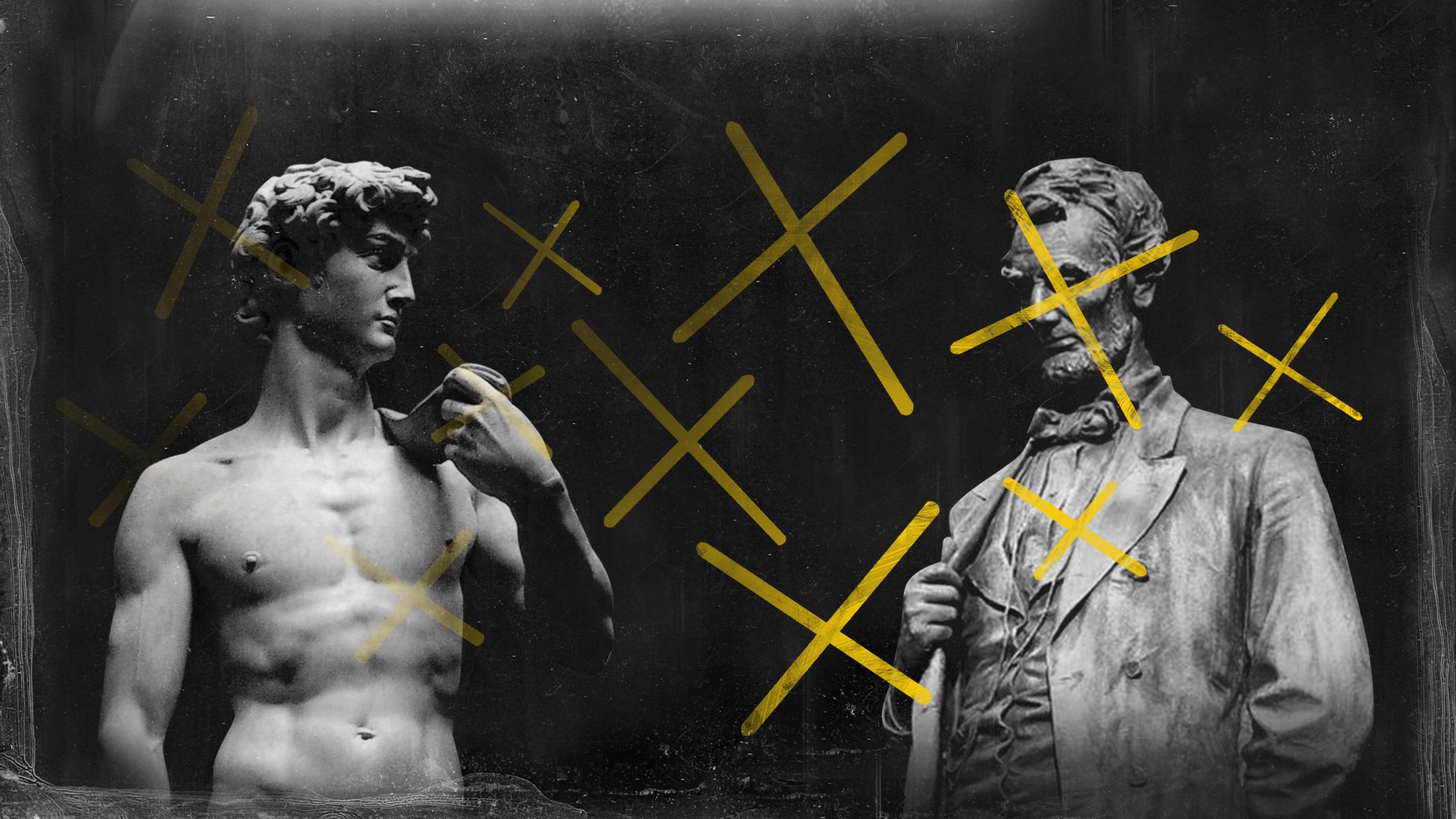Marcionism is a heresy, but I understand why Marcion did it.
Disgusted with the evil that plagues our world and struggling with confounding portrayals of God in Scripture, the second-century theologian sliced up the Bible to his liking by excluding all the Old Testament and even some of the New. I can’t follow Marcion in his editing project, but I certainly get the tension that prompted it: The Old Testament is a difficult book full of difficult stories and difficult people. In many ways, it would be easier to safely scuttle its strange and grim passages out of the canon.
I suspect Marcion’s end product possessed a clarity the unabridged version frankly lacks. But I also suspect it would leave Christians far less equipped to grapple with the moral ambiguity we cannot edit out of our society’s past—or its present.
This has been a summer of iconoclasm. Protests sparked by the killing of George Floyd by Minneapolis police officers have picked up the purgatorial impulse of previous demonstrations against police brutality and racial inequality. Protestors demanded the removal of—or, in many cases, simply vandalized—Confederate statues and flags. Then the scrutiny broadened. A mere three years ago, President Donald Trump was roundly mocked for his musing that progressive iconoclasts eventually would come after George Washington or Thomas Jefferson. This year they did exactly that. Monuments of other historical figures (including Abraham Lincoln, Teddy Roosevelt, and Ulysses S. Grant) were torn down, voted down, or became the subject of contentious debates.
What do we make of someone like Thomas Jefferson? Should he be honored or deplored?
These conflicts are not easy to resolve. What do we make of someone like Jefferson? Should he be honored or deplored? He wrote about the inherent rights of all humanity in words that have inspired movements for freedom the world over—but at the same time he enslaved hundreds and raped Sally Hemings, impregnating her when she was about 15.
Jefferson condemned slavery but did not act to end it, even rejecting, as columnist Noah Millman describes, “a large bequest from his old friend, the Polish nobleman and Revolutionary War hero Thaddeus Kosciusko, intended for the purchase of slaves to give them their freedom, along with land, livestock, and farm equipment to enable them to live the life of yeoman independence that Jefferson claimed to favor over all others.” And yet, for all that, abolitionist Frederick Douglass deemed Jefferson’s Declaration of Independence “the ring-bolt to the chain of [our] nation’s destiny,” a document of “saving principles” to which we should be true “on all occasions, in all places, against all foes, and at whatever cost.”
There is a pleasing ethical simplicity in the idea of taking Marcion’s sharp knife to historical figures like Jefferson (who was, funnily enough, something of a Marcionite himself). Toss him entirely on account of his grossest sins, or paper them over with his wonderful words? We dare not settle for less than ideological purity. A flawless hero is the most comfortable kind.
Christians can do better. The Old Testament has trained us for it. If Jefferson is the archetypal difficult figure of American history, his biblical analogue is surely King David: the passionate and poetic psalmist who raped Bathsheba. What do we make of someone like David? There’s no option here to keep the words and dispense with the man, because the man is all over the Bible. Again and again the Gospels reiterate that Jesus is the “son of David” long awaited, born in David’s village and destined to sit on David’s throne. David appears in the Apostle Paul’s great argument on justification in Romans, and he makes the Hebrews 11 roster of (very flawed) heroes of the faith. In Revelation 22:16, Jesus confirms his testimony with a self-description as “the root and the descendant of David, the bright morning star.” To take a high view of Scripture forces us to confront the moral complexity of David along with so many other scriptural characters, neither tossing them for their sins nor papering over those sins with their faithful achievements. Such confrontation serves as practice for similar discernment of more recent history.
Moreover, we are not the first Christians to contend with complicated people, stories, and ideas. The early church dealt with this often. Many of the first Christian apologists employed the religion and philosophy of the surrounding pagan culture to help make sense of the new Christian faith. Paul’s sermon on Mars Hill in Acts 17 referenced Athenian monuments he wouldn’t otherwise honor and incorporated insights of Greek poets whose whole body of thought he wouldn’t otherwise endorse. Similarly, Augustine advised Christians to “claim … for our own use” whatever we find “that is true and in harmony with our faith,” wherever we find it. “All truth is God’s truth,” the Augustinian logic affirms. We can examine our national history with a similar eye: critical and distant on the one hand, but also receptive to whatever goodness and truth we find on the other.
Finally, basic Christian anthropology prepares us for dealing with historical tension, too. “The culture warriors want to avoid … cognitive dissonance by seeing the [American] Founders as flawless saints or irredeemable sinners,” former CT editor Skye Jethani recently wrote. “They were neither,” he continued, which we ought to know well. The first two things the Christian story says about humanity (Gen. 1–3) is that we are made in God’s image and we are subject to the Fall. We are created for good but, without Christ, we are captive to evil (Rom. 6:17–23). Any understanding of human beings with this beginning will not be shocked to find real good and great evil in the same life, as indeed we find both in our own hearts (Rom. 7:19).
Bonnie Kristian is a columnist at Christianity Today, a contributing editor at The Week, a fellow at Defense Priorities, and the author of A Flexible Faith: Rethinking What It Means to Follow Jesus Today (Hachette).










